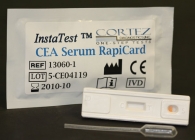
ELISA Kits
- • Anemia ELISA kits
- • Allergy ELISA kits
- • Autoimmune Disease kits
- • Bone Metabolism ELISA kits
- • Blood bank ELISA kits
- • Cancer ELISA kits
- • Cardiac Markers ELISA kits
- • Diabetes Assays ELISA kits
- • Drug test ELISA kits
- • Fertility ELISA kits
- • Food ELISA kits
- • Infectious Disease ELISA kits
- • Other ELISA Kits
- • Parasitology ELISA kits
- • Steroid ELISA kits
- • Thyroid ELISA kits
Rapid Tests
- • Allergy Rapid tests
- • Bone Metabolism
- • Cancer Rapid tests
- • Cardiac markers Rapid tests
- • Drug Tests
- • Fertility Rapid tests
- • Hepatitis Panel
- • Infectious Disease & other tests
- • Other
- • Ovulation Rapid tests
- • Pregnancy tests
- • Urine Reagent Strips tests
IFA Kits
Chemiluminescence Immuno Assays
- • Allergy Assays
- • Autoimmune Thyroid Assays
- • Cardio-Vascular Monitoring
- • Diabetes Assays
- • Fertility Assays
- • Growth Deficiency
- • Infectious Disease Assays
- • Others
- • Steroid Assays
- • Thyroid Assays
- • Tumor Marker Assays
Serology Tests
- • ASO (Anti-Streptolysin-O)
- • CRP (C-Reactive Protein)
- • Mono (Infectious Mononucleosis)
- • RF (Rheumatoid Factor)
- • RPR (Rapid Plasma Reagin)
- • SLE (Systemic Lupus Erythematosus)
Instrumentation



CEA Rapid Test (Serum/WB/Plasma)
| Name |
CEA Serum Rapid Test (Cassette) |
|---|---|
| Full name |
OneStep CEA RapiCard™ InstaTest (Serum/WB/Plasma), Export Use Only |
| Category Name | Cancer Rapid tests |
| Test | Bulk, 40 Tests |
 |
 |
 |
CEA Rapid Test (Serum/WB/Plasma) description:
"Export Use Only"
Diagnostic Automation/Cortez Diagnostics Inc. OneStep CEA Test is a colloidal-goldantibody complex based immunoassay designed for the qualitative determination of human carcinoembryonic antigen (CEA) in serum or plasma. It is intended as an aid in monitoring cancer patients for disease progression or response to therapy or for the detection of recurrent or residual disease. This CEA Rapid Test is used as an aid in the diagnosis of colorectal, breast, lung, and pancreas cancers
Materials Provided with CEA Rapid Test Kits:
1. CEA Rapid Test Cassette:
An absorbent device with an antibody coated membrane and a
pad treated with polyclonal IgG-dye conjugate
2. Sample Dropper:
A transfer pipette is included with each test device inside the
foil pouch
3. Test Instructions
Materials required, not Provided:
1. Specimen collection container
2. Centrifuge
3. Clock or timer
CEA Serum Rapid Test Background Information:
Carcinoembryonic antigen (CEA), first described in 1965 by Gold and Freeman, is a tumor-associated antigen characterized as an oncofetal glycoprotein. The OneStep CEA Test is a recently developed, sensitive and less complicated immunoassay of CEA. CEA was first present as a specific antigen for adenocarcinoma of the colon. More recent studies have demonstrated CEA presence in a variety of malignancies, particularly those involving ectodermal tissues of gastrointestinal or pulmonary origin. Small amounts have also been demonstrated in secretions from the colonic mucosa. Additionally, CEA-like substances have been reported in normal bile from non-icteric patients. CEA testing can have significant value in the monitoring of patients. Persistent elevation in circulating CEA following treatment is strongly indicative of occult metastic and/or residual disease. A persistent rising CEA value may be associated with progressive malignant disease and poor therapeutic response. A declining CEA value is generally indicative of a favorable prognosis and good response to treatment. Measurement of CEA has been shown to be clinically relevant in the follow-up management of patients with colorectal, breast, lung, prostatic, pancreatic, ovarian, and other carcinomas. Follow-up studies of patients with colorectal, breast and lung carcinomas suggest that the preoperative CEA level has prognostic significance. CEA testing is not recommended as a screening procedure to detect cancer in the general population; however, use of the CEA test as an adjunctive test in the prognosis and management of cancer patients is widely accepted.
CEA Serum Rapid Test Principle:
The OneStep CEA Test is an immunochromatographic assay which utilizes a unique combination of monoclonal and polyclonal antibodies to selectively identify CEA in serum or plasma specimens with a high degree of sensitivity. Elevated levels of CEA are detected in ten minutes or less. Serum specimen migrates through the absorbent device and mixes with labeled antibody-dye conjugate in the test membrane. CEA antigen present in the specimen binds to the labeled conjugate to form an antibody-antigen complex. In the test zone, anti-CEA antibody binds to the antibody-antigen complex causing a pink-rose test band to appear in the test zone "T." The test band indicates that the CEA level in the sample specimen is at or above the detection sensitivity of the test. In the control zone "C," unbound sample-dye conjugate binds to immobilized reagents producing a rose-pink color control band. The control band appears when the test is conducted correctly and the reagents are functioning properly. For additional details please refer to the instructions for use.
Notable features of the CEA Serum Rapid Test:
reliable and inexpensive
convenient and easy-to-understand directions
clear preparation procedures
simple and safe specimen collection directions
comprehensive package of required materials and components
rapid and accurate test results - 10 minutes
See CEA Serum Rapid Test Product Insert for specific details on preparation, procedures, quality control, and interpretation of test results.
Diagnostic Automation Inc. also offers other Cancer Rapid tests, and Cancer ELISA test kits. For more information about this CEA Serum Rapid Test or other Rapid tests, CLIA tests, IFA Kits, or ELISA test kits, please contact our Customer Service Representatives at 818-591-3030.
*Not to be sold, shipped, or distributed in the United States.
ELISA kits - Rapid tests- Drug tests- Pregnancy test - IFA kits - CLIA assays - Serology tests - Instrumentation
©1992 Diagnostic Automation/Cortez Diagnostics Inc. All rights reserved.








